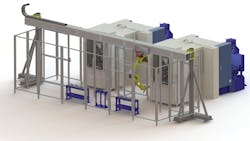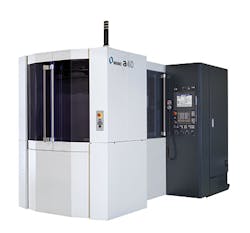Purpose-Built Grinding and Finishing for Aluminum Diecasting
As automotive designers aim for lower vehicle weights to achieve higher fuel-economy standards, they are driving automakers to rely on higher volumes of component parts in lighter materials, in particular aluminum and nonferrous alloy diecastings. Metalcasters have options for expanding their melting and casting volumes, but they may not have recognized a cost-saving opportunity without the insight of a machine-tool developer.
“Diecasting manufacturers are under intense pricing pressure with mandatory cost reductions from OEMs and increasing global competition,” reminded David Ward, product line manager for horizontal machine tools with Makino — the company that introduced a machining center “purpose built” for this specific market niche.
Makino’s insight is that metalcasters installing general-purpose machining centers to grind or finish near-net-shape castings are investing in “over-designed” systems, with unnecessary capabilities that may increase the operating costs and extend cycle times. Ward asserted that the way to overcome this is to reduce machining cycle times and unplanned downtime, which is the promise of Makino’s a40 system, a horizontal machining center purpose-built for near-net-shape aluminum diecastings.
“To address the cycle time issue, Makino has re-evaluated each of the major castings using an “Intelligent Reduction of Inertia” design philosophy,” he explained, achieving “superior linear and radial agility and acceleration.”
Intelligent ROI is Makino technology package that works to reduce “non-cutting” time from part processing. For the a40 system, it involves a spindle that accelerates to 12,000 rpm in 0.5 seconds; 6,000-rpm rigid tapping speed; and 29% faster speed to full rapid traversal, which minimizes the cutting tools’ feature-to-feature positioning time. The machine center also has Inertia Active Control technology, which optimizes the acceleration of multiple machine functions by evaluating and adapting fixture and tool weights.
The a40 has a 400-mm pallet with a workpiece capacity of 630x900 mm (24.8x35.4 in./ DxH), meaning it is well proportion for a majority of diecast parts commonly machined in automotive and consumer products manufacturing.
The machine’s axis travels are 560, 640, and 640 mm (22.0, 25.2, and 25.2 in. / X, Y, and Z.) The maximum payload is 400 kg (880 lbs.)
In addition, Makino addressed the issue of unplanned down time, which undermines the production design goal of a high-volume diecasting operation. The a40’s system reliability is supported by systems proven in other Makino horizontal machining centers, like single-piece X- and Z-axis covers, center trough chip and coolant management, and dual-supported ATC mechanisms that promote reliability throughout the life of the machine.
In addition, the system is outfitted with new technologies, like broken tool detection, which allows unattended operation by quickly validating the condition of the cutting tools after each tool change; dedicated tool taper cleaning nozzles that wash the tool taper with 20μ filtered coolant with each tool change, and ensuring contamination free tool clamping; and three stage coolant filtration with a 20μ hydro-cyclone, which significant reduces coolant tank sludge (as is common with aluminum machining) and extends the time between coolant system preventive maintenance or cleaning.
Makino emphasized that the a40 HMC gives high-volume diecasting operations a machine that is designed specifically with their production goals in mind. It will reduce part machining cycle time not only on the cost-per-piece basis, but will provide savings in capital investment, labor cost, floor space, utility consumption, and tooling cost.
About the Author
Robert Brooks
Content Director
Robert Brooks has been a business-to-business reporter, writer, editor, and columnist for more than 20 years, specializing in the primary metal and basic manufacturing industries. His work has covered a wide range of topics, including process technology, resource development, material selection, product design, workforce development, and industrial market strategies, among others.

